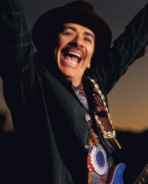Most rock artists who've survived the '60s have gotten better, gotten worse or reinvented themselves in some way, but Santana has always been Santana. Not that the band's been exactly the same all this time: It's had more than two dozen lineups, and some fans will always insist that the first, most rocking version from the late '60s was the best. But leader Carlos Santana has never lost his fire, and the signature sound of his guitar wailing over organ and congas is so strong that whether he plays rock, jazz, Latin or funk, he's still playing Santana music. Originally, Santana simply fused his Latin influences with the jam-heavy sound of West Coast rock. The first album, and the Woodstock performance of 'Soul Sacrifice,' were largely responsible for hundreds of bands adding congas to their lineups (including the Rolling Stones on 'Can You Hear Me Knocking'). The original Santana had more hits than any future incarnation, usually with arrangements of outside material (Fleetwood Mac's 'Black Magic Woman,' Olatunji's 'Jingo,' Tito Puente's 'Oye Como Va,' Willie Bobo's 'Evil Ways'). The one major departure came in 1972, when Santana took a hint from his friend and occasional collaborator, John McLaughlin, and headed in a spiritually-inclined jazz/fusion direction. The albums in this vein (1972's Caravanserai, 1973's Welcome and 1974's Borboletta) were the band's most adventurous. Beginning with 1976's Amigos, he kept stretching out instrumentally, but filtered in some mainstream rock and dance elements and has maintained that mix ever since.
For years, Santana released a lot of music--usually an album every year either under the band's name or his own (the two are pretty much interchangeable). As a result, there were many good Santana albums, but few definitive ones. (Some of his most creative works--the R&B-flavored Havana Moon and the jazz-oriented The Swing Of Delight--came out as 'Carlos Santana' albums). Neither he nor the band had a major hit since 'Winning' (from the mainstream-slanted album Zebop!) in 1981, but his reputation hinged on live shows, where there was still an emphasis on improvs and where it was still a safe bet that he'd hit upon something brilliant. If nothing else, he deserved credit as one of the few 'classic rock' acts that was not satisfied to go onstage and play the oldies.
In 1999, however, all this changed when Santana made a dramatic comeback with the album Supernatural, driven by hit single 'Smooth,' a collaboration with Matchbox Twenty's Rob Thomas on vocals (Thomas also co-wrote the song). The album spent multiple weeks at the top of the charts, went platinum 25 times over worldwide, and earned Santana a record nine Grammy awards. Supernatural's long-awaited follow-up, Shaman, came out in late 2002; like Supernatural (which also boasted appearances by guests Everlast, Wyclef Jean, and Dave Matthews), the new album featured many big-name, modern-day collaborators, including Michelle Branch (who sang on the CD's first single, 'Game Of Love'), P.O.D, Ozomatli, Macy Gray, Musiq, and Dido.



